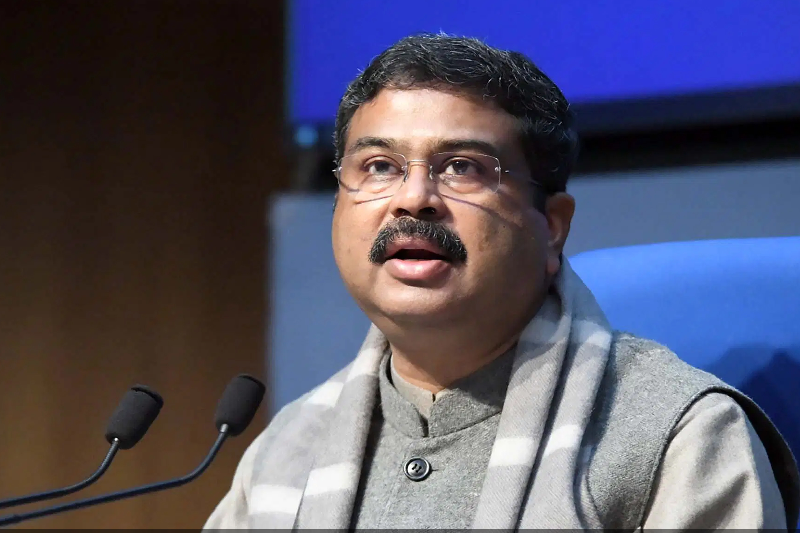
AI as a Necessity: Education Minister Dharmendra Pradhan Advocates for Mass AI Literacy and Indigenous Innovation
In a powerful address at the ‘PadhAI: Conclave on AI in Education’ held in New Delhi, Union Education Minister Dharmendra Pradhan underscored the transformative role of Artificial Intelligence (AI) in reshaping India's education system. Organized by the Centre for Policy Research and Governance (CPRG), the two-day conclave brought together policymakers, academics, and technologists to discuss AI’s expanding footprint in Indian education. Speaking at the event, Pradhan stressed that AI is no longer a luxury or futuristic concept—it has become a “basic necessity” akin to the internet.
AI in Education: Inevitable and Essential
In his keynote address, Dharmendra Pradhan said that discussions around AI are now central to academic conversations across the country. "There are hardly any higher education institutions in India where AI is not discussed," he noted. Declaring AI both “inevitable and essential,” he likened it to the internet in terms of its pervasiveness and relevance to everyday life. According to Pradhan, the integration of AI into education is not just a possibility but an urgent need.
The Minister emphasised that increased access to technology has created a "highway of empowerment" for students, enhancing their academic, social, and professional capabilities. He believes that AI has the potential to create more equitable learning environments and open new avenues for innovation and discovery.
India’s Strength: Human Intelligence Driving Indigenous Innovation
One of the central themes of Pradhan’s address was India’s potential to drive indigenous technological solutions. “India's human intelligence has the power to transform any emerging technology into an indigenous innovation,” he stated confidently. This assertion reflects the government's broader strategy of not just adopting global technologies but adapting and evolving them to suit Indian contexts and needs.
Pradhan reiterated that while the world advances rapidly in AI, India must position itself not only as a consumer of this technology but as a global innovator. To this end, policy action must support both technological literacy and entrepreneurial ecosystems.
Policy Focus: Building AI Literacy at Scale
In response to the urgent need for AI preparedness, Pradhan outlined the government’s vision for large-scale AI literacy. He advocated for the integration of AI modules across various levels of education, from school curricula to higher education programs and vocational training. “We must prepare every student to interact with AI tools, understand their implications, and develop skills for the future,” he said.
Pradhan also called for institutional support to nurture AI innovation, including funding, incubation centres, and collaborative platforms that bridge academia and industry.
CPRG’s Role: Facilitating Future-Focused Policy Dialogues
The Minister lauded the Centre of Policy Research and Governance (CPRG) for organising the PadhAI Conclave and fostering critical dialogue around technology and policy. He called the event “timely and much-needed,” especially as AI becomes a central theme in educational reform and digital transformation strategies.
CPRG, a think tank recognised by the Indian Council of Social Science Research (ICSSR), has positioned itself as a key player in technology policy through its ‘Future of Society’ initiative. With a strong focus on responsive and participatory policymaking, CPRG aims to ensure that emerging technologies, such as AI, are implemented in ways that are ethical, inclusive, and impactful.
Language and Context: The Role of Indian Languages in AI
Another critical voice at the conclave was Chamu Krishna Shastri, Chairman of the Bharatiya Bhasha Samiti under the Ministry of Education. Shastri addressed the pressing need to strengthen the presence and relevance of Indian languages within the AI ecosystem.
“AI must be purposeful and contextual,” he said, highlighting that language inclusion is crucial for AI applications to be truly accessible and impactful in India’s diverse linguistic landscape. He argued that the development of AI tools in Indian languages is essential to ensure equitable access and usage across different regions and communities.
Key Themes Explored at the PadhAI Conclave
The two-day conclave facilitated in-depth discussions on the evolving relationship between AI and education in India. Sessions explored how AI is:
- Transforming learning beyond classrooms: From personalised learning platforms to intelligent tutoring systems, AI is enabling education to extend beyond traditional boundaries.
- Reshaping higher education: AI tools are being integrated into curriculum development, research, and administrative processes to make institutions more agile and responsive.
- Highlighting institutional bottlenecks: Experts discussed challenges such as outdated curricula, lack of skilled faculty, and inadequate digital infrastructure that must be addressed to maximise AI’s potential.
Conclusion: Charting India’s AI-Enabled Educational Future
As India continues its digital transformation journey, AI will play a decisive role in shaping its educational landscape. The PadhAI Conclave served as a reminder that while technology offers unprecedented opportunities, it must be implemented thoughtfully, with a strong focus on inclusivity, contextual relevance, and indigenous innovation.
Union Education Minister Dharmendra Pradhan’s address signalled a clear policy direction: mass AI literacy, robust innovation ecosystems, and purposeful application of AI in education. With institutions like CPRG championing collaborative policy-making and leaders advocating for the responsible integration of AI, India is well-positioned to lead in creating an education system that is both futuristic and rooted in its cultural and linguistic diversity.



